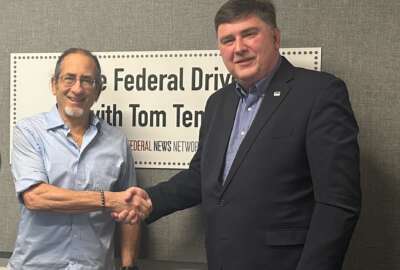Virtual reality shows real promise for PTSD
Virtual reality applications are being designed and implemented across various points in the military deployment cycle to prevent, identify and treat combat-related...
wfedstaff | June 3, 2015 8:43 pm
By Suzanne Kubota
Senior Internet Editor
FederalNewsRadio.com
We were probably all told as children, if you pick at a wound, “it’ll never heal,” but the Army is finding that’s not necessarily how it works when it comes to treating Post Traumatic Stress Disorder.
“By confronting the traumatic memories,” said Dr. Albert “Skip” Rizzo, “you’re actually processing them in a way that makes them less painful and less anxiety provoking.”
Rizzo, Associate Director at the Institute for Creative Technologies at the University of Southern California and an expert on virtual approaches to PTSD, explained to Federal News Radio that virtual reality (VR) applications are being designed and implemented across the military as a tool for exposure therapy.
By confronting the traumatic memories you’re actually processing them in a way that makes them less painful and less anxiety provoking. If you avoid thinking about the things that went on in your deployment and try to put it away and not deal with it, they still come out. They come out in nightmares and flashbacks, in extreme hypervigilance, in avoidance of places that remind you of things that remind you of things that you’ve seen on your deployment. And that’s really at the core of PTSD, this avoidance factor.
The idea, said Rizzo, is to use a video game-like environment with a set of generic scenarios and put the person in it. “At the basic level, it’s not very provocative. There’s just the sound of wind, there’s no people and so forth,” said Rizzo, “but then we can begin to systematically add elements into the scene in order to pace the exposure at a level that gets the patient to confront the traumatic memories, but at a pace that they can handle.”
The patient narrates what he or she is seeing and thinking as the simulation of their memories goes on. Tweaks are made to the VR and the simulation repeated. Each time, said Rizzo, the story grows.
And that’s when you start to see people turn the corner. When they’re able to talk about and process these kinds of very difficult memories that they try to push down and avoid thinking about. When they go through this processing activity, it ends up that these memories become a little bit easier to bear.
Data so far, said Rizzo, has been encouraging, adding that here are three trials underway, and previous open clinical trials and case studies “have all been pretty positive in their results.”
With success has come acceptance of the treatment, said Rizzo.
“People have come to see that this isn’t some hair-brained science fiction approach, but rather, relies on the principles of an already established…treatment, exposure therapy, but we’re able to do it in a more systematic and controlled fashion, and it has a lot of promise.”
According to Health.mil, “Dr. Albert ‘Skip’ Rizzo and his colleagues at the University of Southern California’s Institute of Creative Technology are credited with developing the concept of Virtual Iraq, a virtual reality exposure therapy for treatment of post-traumatic stress disorder, based on the video game Full Spectrum Warrior. Rizzo and his team at USC/ICT collaborated with the Naval Medical Center San Diego, Virtually Better Inc., and the Geneva Foundation to develop the virtual reality exposure therapy system.”
This story is part of Federal News Radio’s daily DoD Report. For more defense news, click here.
Copyright © 2025 Federal News Network. All rights reserved. This website is not intended for users located within the European Economic Area.





